The island of Achill off the north-west coast of Ireland really made a deep impression on me. And it’s not really an island at all, because you can easily reach it via a bridge…
Page Contents (click line to jump the text)
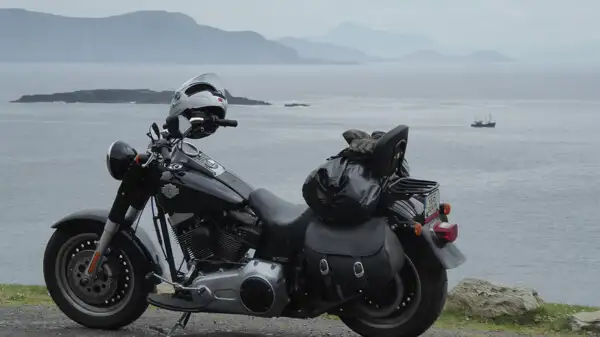
Intro
Rugged beauty is a good way to describe it. The writer Heinrich Böll lived here for some time and wrote his “Irish Diary” here. And he wrote extensively about the many different types of rain you can experience here.
I can well imagine that autumn or winter storms in a small cottage in this rugged landscape can have an even greater effect on the mind than in a terraced house on the outskirts of a city.
But as I explore Achill Island on my motorbike, I’m in luck: it’s summer and the weather is pleasant. The sky is mostly cloudy, as is so often the case in Ireland, but it was neither cold nor wet – everything was fine!
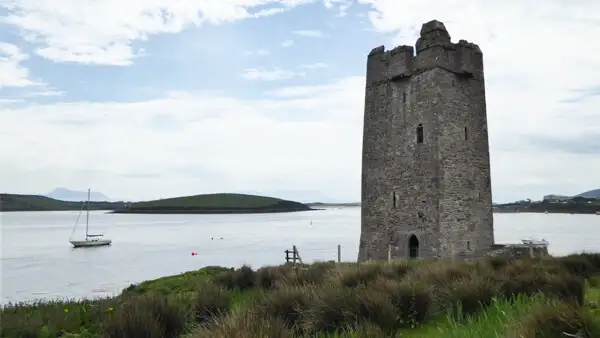
I drive over the small bridge onto the island, which therefore feels more like a peninsula, and follow the southern coastal road.
I chug along the bay past Grace O’Malley’s Tower. Grace O’Malley was a famous clan chief and pirate who ruled these waters in her day (in the 16th century). The tower watches over a sheltered bay where boats are moored.
Just a few bends further on, a truly marvellous coastal road opens up before me! Open sea to the left, marshy hills to the right, a cottage at the side of the road. The narrow road follows the coastline and the view sweeps into the distance.
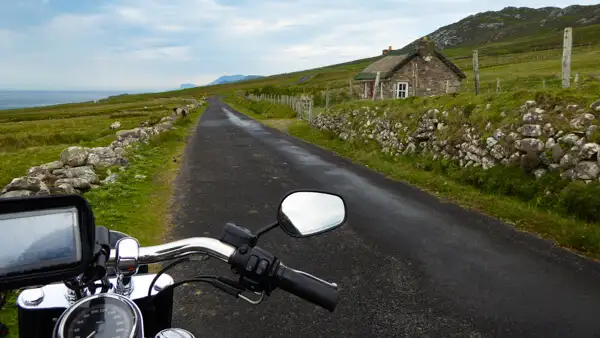
A few more bends bring me to the White Cliffs of Ashleam. The small gravel car park at the side of the road is a viewpoint and offers wonderful views of the cliffs, which are actually quite white and grey.
Keel is probably the main town on the island. There is a large, white sandy beach, a few shops, a campsite (or several?) and a few holiday flats. The rocky mountains rise high inland and form a spectacular backdrop for the hundreds of sheep grazing on the flat meadows in front of the beach.
I leave Keel behind me and continue along the coastal road towards Keem Bay. The tiny, single-lane road winds steeply up the mountain. At the top, my breath is finally taken away: the view is simply incredible!
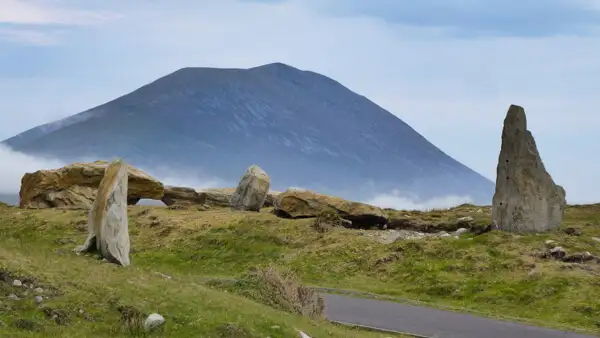
On the mountainside, individual vertical rocks stand picturesquely in the landscape – are these standing stones, or menhirs?
Standing high above the cliffs of the coast, I look into the small bay of Keem Bay, onto the beautiful crescent-shaped Keem Beach. Sheep graze comfortably on the edge of the precipice and move slowly – as ordered – through my picture.
A fishing boat chugs along the coast far below me and the view into the distance reveals further stretches of coastline, cliffs and mountains. A dream!
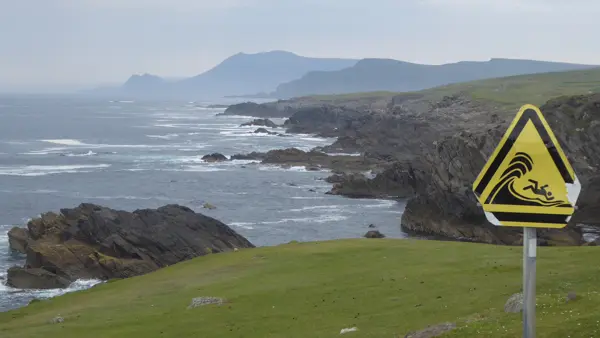
I drive down the winding road to Keem Beach and enjoy the wonderful bay for a while before heading back. Across the mountains of the island and over the small bridge back to the mainland.
I didn’t visit Heinrich Böll’s cottage or the Slievemore Deserted Village. The village is a collection of abandoned and dilapidated workers’ cottages high on the mountainside above Keel. I haven’t yet visited the beaches on the north coast of Achill Island either. I would have liked to spend more time here, but the day has progressed and I still have quite a few kilometres to go that day.
“I’ll do that next time,” I console myself. And I will definitely come back to Achill Island again!
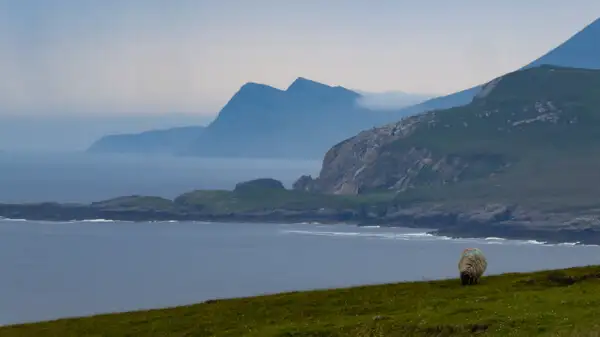
A few facts to Achill Island
Achill Island is the largest island off the coast of Ireland at just under 150 square kilometres. However, it has fewer than 3000 inhabitants. The island belongs to the Gealtacht Regon, the regions in the west of Ireland where Gaelic is still actively spoken and English is sometimes the second language.
Some smaller ring forts and dolmens bear witness to the island’s early settlers, who probably lived here around 3000-4000 BC.
The landscape is partly mountainous and characterised by peat bogs and steep cliffs, but also very beautiful sandy beaches.
Until the middle of the 19th century, people on Achill Island lived mainly from farming and fishing. Farming was a tenancy system where tenants worked small plots of land and paid rent to the landowner. Virtually all land belonged to aristocrats at the time.
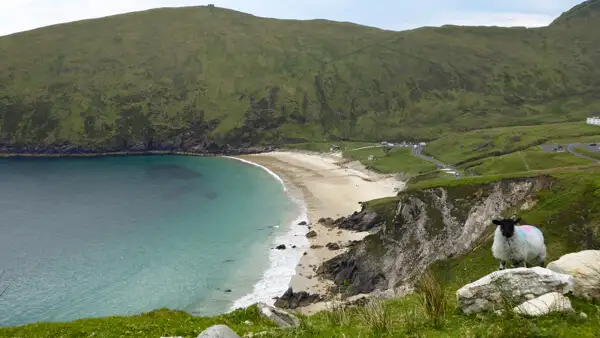
In the middle of the 19th century, when a great plague almost completely destroyed the potato crops for several years and there was a great famine, people either emigrated or moved to the coast to make a living from fishing, as here on Achill Island. The Deserted Village was abandoned at that time and is now one of the few places of interest on the island.
Incidentally, basking sharks can always be seen off the coast here. They live off plankton and filter the water with their gills. Many other species of dolphins and whales, as well as seals and seabirds, also live in the fish-rich waters around the island.
Other sights include Heinrich Böll’s cottage, the Grace O’Malley Tower and the Achill Experience Aquarium and Visitor Centre.
However, the real attractions of the island are its wild beauty and incredible coastline. And so it is hardly surprising that the island lives primarily from tourism today. See also: https://achilltourism.com/.
Conclusion
I’ve already anticipated everything: This island in the north-west of Ireland is incredibly impressive – huge coastlines, barren mountains and moors and fantastic views.
Have I whetted your appetite to visit Achill Island? That’s right, you’ll love it!
With this in mind, have fun on the island off the (Irish) island!
More interesting articles for you
BURRISHOOLE ABBEY – A PRETTY RUIN AT CLEW BAY
THE CÉIDE FILEDS – LONG BEFORE THE CELTS
DONEGAL – A NICE AND COSY LITTLE TOWN
THE CLIFFS OF SLIEVE LEAGUE – MAJESTIC AND MARVELLOUS
Picture credits cover picture: Coast at Achill Ireland, photo: Ulrich Knüppel-Gertberg (www.irland-insider.de, www.ireland-insider.com)